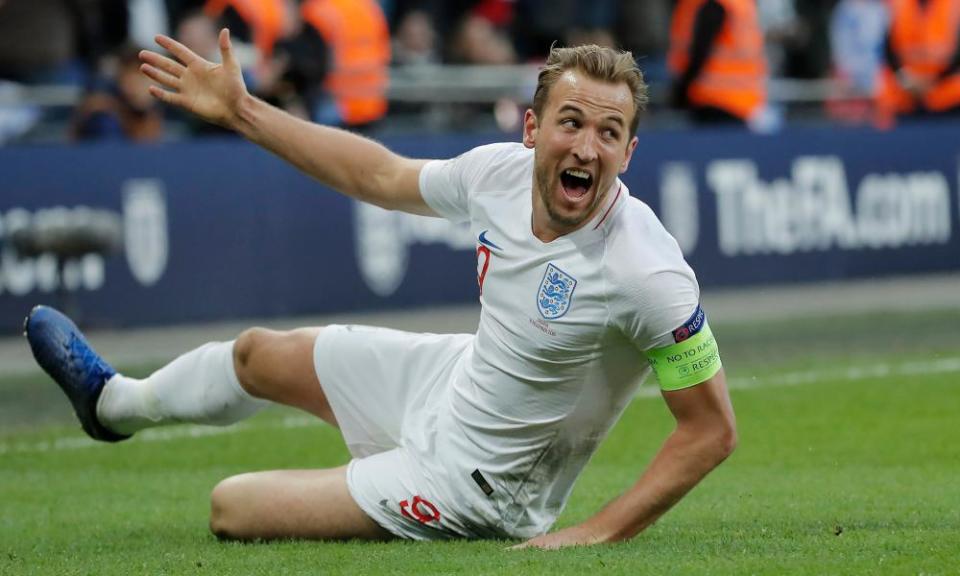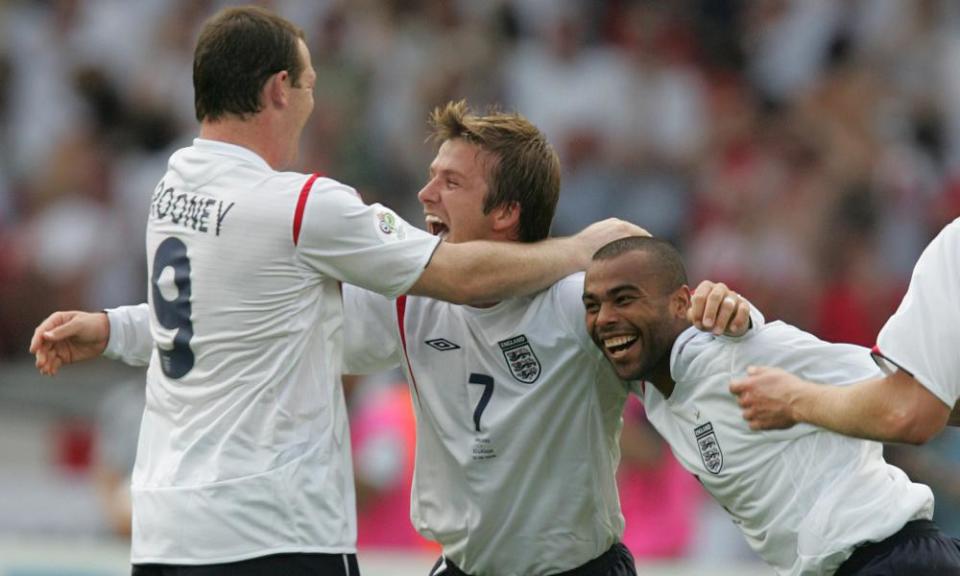Harry Kane and the beer garden that made England his No 1 priority

Every football fan remembers their first major international tournament and normally as much for the atmosphere around the games, the noise and colour, where they watched them and with whom, as the finer details on the pitch.
The bug tends to bite at eight or nine and so for Harry Kane, who was born in 1993, it was the 2002 World Cup, for which England had qualified when his hero, David Beckham, scored his famous last-gasp free-kick against Greece. England would fall to Brazil in the quarter-finals.
Related: England must choose between pace and technique in their forward planning | Barney Ronay
Where it starts to clarify for Kane – as with many others – where the notions of time and place are reinforced, together with what it all means, the broader sense of belonging, are the two tournaments after that.
In those days, the pub in Chingford – Kane’s old neighbourhood in east London – was called The Sirloin and he watched almost all of England’s ties at Euro 2004 and the 2006 World Cup in its huge beer garden. He was there with his parents, Pat and Kim; his older brother, Charlie; many, many family friends and assorted others. It was probably easier to say who was not present and correct from the local area.
Legend has it that thousands would watch some England games, singing raucously, glued to the big screen; that the feeling was similar to being inside a stadium. After England’s failure to qualify for Euro 2008, Kane even followed the team at The Sirloin in the 2010 World Cup and Euro 2012 – by which time he had started to make his way in the professional game.
It was the early tournaments that shaped Kane. The quarter-final defeats of 2004 and 2006 – both to Portugal, both on penalties – continue to draw a grimace but what has stayed with him, above everything else, is how the national team were able to bring people together, to make them happy.
It did not matter in the mayhem of the Sirloin whether you were Tottenham or Arsenal, West Ham or Chelsea – the feeling of community was powerful, almost overwhelming, to the young Kane.
It is why England will always be the most important thing to him, more so than Spurs or wherever he ends up in the future. This is no slight on his boyhood club, with whom he has experienced great times; just that nothing, in his opinion, can match the emotion of England. When Kane was 10 and 12, he would dream of being one of the players that he watched on the big screen, maybe the captain, and he is now savouring every heartbeat of the experience, feeding off the romance of his journey.

Kane approaches the delayed Euro 2020 finals at a crossroads, having accepted that he cannot achieve his ambition of winning team trophies at Spurs and informed the club of his desire to leave.
The exit strategy has been actioned, with the big play being the interview that he recently gave to the Sky Sports pundit Gary Neville, in which he did not explicitly say he wanted a transfer but did pretty much everything else. Reading between the lines has never been so straightforward. It was released hard on the heels of the story that first broke on Sky that Kane was looking to move to an English rival – most likely Manchester City.
What frustrates Kane is the omerta that Premier League players are required to follow, particularly when it comes to transfers. Why should they be denied the opportunity to articulate their side of the situation; why should it all be via off-the-record steers? He is known to prefer the greater transparency that exists in the United States between sports stars and the media. To him it feels more grown up.

Kane has decided that honesty and openness is the best policy, possibly after his behind-the-scenes attempts to leave Spurs last summer got him nowhere. He has placed himself in the court of public opinion, reasoning that if Spurs fans, even the heartbroken ones, can understand his reasons, which come from a respectful place, then perhaps they can give him their blessing. And if they cannot, then OK. Nothing will overcome their blood ties to the club.
It is the latest display of Kane’s singlemindedness, of his desire to reach unapologetically for the very top and, if anyone believes that the developing saga could undermine his performances in an England shirt, then they do not know very much about him.
Expect Kane to be peppered with questions about his club future when he faces the media but to stress that it is all about the Euros. His focus on what he has to do over the next month or so has never been clearer.
The question of whether Kane can outmanoeuvre the Spurs chairman, Daniel Levy, who has him on a contract until 2024 and is dead against selling him, is one for later in the summer.
Kane is simply consumed with possibility – most immediately, achieving glory at his third major championship with England. The first one was a disaster, with everybody remembering how Euro 2016 ended with defeat against Iceland. It seems like a trick of the mind that Kane had been designated as the team’s corner taker.
The 2018 World Cup went rather better, and Kane can still feel the momentum generated by the run to the semi-finals when he was the competition’s leading goalscorer. Golden Boots are lovely and he has just collected his third in the Premier League to go with the award for being the competition’s top assist maker. All this at a club that finished seventh.
During the last World Cup, Kane was sent a video clip from The Sirloin – since renamed as The Dovecote. It came from a family friend who had watched many of those England games with Kane in his youth and it showed the riotous beer garden celebrations during the group stage drubbing of Panama. Kane scored a hat-trick in that game.
It was a moment that resonated deeply with Kane, tying his past to his present. He intends to have the place jumping again.

 Yahoo Sport
Yahoo Sport 





































